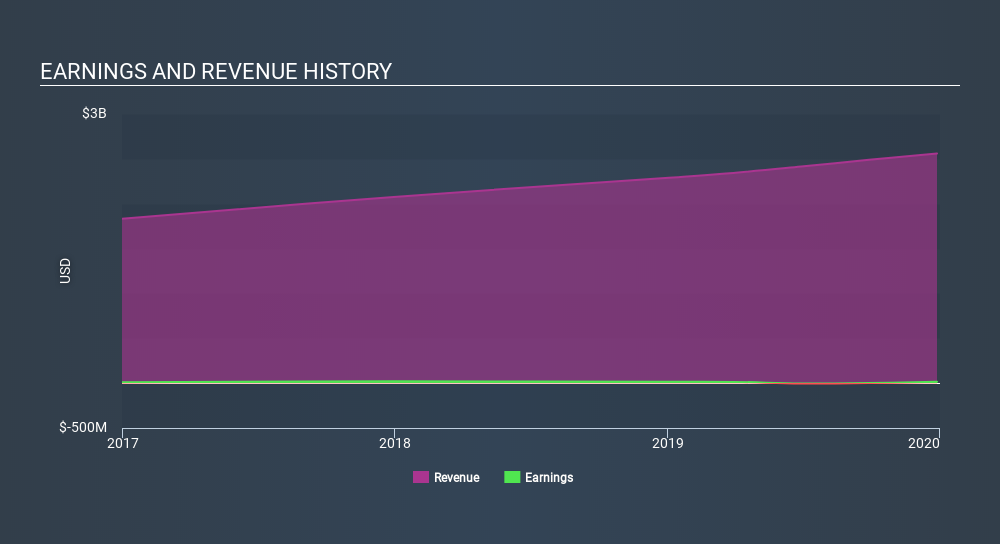- United States
- /
- Food and Staples Retail
- /
- NasdaqGS:GO
Does Grocery Outlet Holding's (NASDAQ:GO) Statutory Profit Adequately Reflect Its Underlying Profit?

Broadly speaking, profitable businesses are less risky than unprofitable ones. That said, the current statutory profit is not always a good guide to a company's underlying profitability. In this article, we'll look at how useful this year's statutory profit is, when analysing Grocery Outlet Holding (NASDAQ:GO).
We like the fact that Grocery Outlet Holding made a profit of US$15.4m on its revenue of US$2.56b, in the last year.
Check out our latest analysis for Grocery Outlet Holding

Of course, it is only sensible to look beyond the statutory profits and question how well those numbers represent the sustainable earnings power of the business. In this article we'll look at how Grocery Outlet Holding is impacting shareholders by issuing new shares. That might leave you wondering what analysts are forecasting in terms of future profitability. Luckily, you can click here to see an interactive graph depicting future profitability, based on their estimates.
In order to understand the potential for per share returns, it is essential to consider how much a company is diluting shareholders. In fact, Grocery Outlet Holding increased the number of shares on issue by 15% over the last twelve months by issuing new shares. That means its earnings are split among a greater number of shares. To talk about net income, without noticing earnings per share, is to be distracted by the big numbers while ignoring the smaller numbers that talk to per share value. Check out Grocery Outlet Holding's historical EPS growth by clicking on this link.
A Look At The Impact Of Grocery Outlet Holding's Dilution on Its Earnings Per Share (EPS).
Unfortunately, we don't have any visibility into its profits three years back, because we lack the data. Even looking at the last year, profit was still down 2.9%. Sadly, earnings per share fell further, down a full 16% in that time. So you can see that the dilution has had a bit of an impact on shareholders. Therefore, the dilution is having a noteworthy influence on shareholder returns. And so, you can see quite clearly that dilution is influencing shareholder earnings.
In the long term, if Grocery Outlet Holding's earnings per share can increase, then the share price should too. But on the other hand, we'd be far less excited to learn profit (but not EPS) was improving. For that reason, you could say that EPS is more important that net income in the long run, assuming the goal is to assess whether a company's share price might grow.
Our Take On Grocery Outlet Holding's Profit Performance
Over the last year Grocery Outlet Holding issued new shares and so, there's a noteworthy divergence between EPS and net income growth. Because of this, we think that it may be that Grocery Outlet Holding's statutory profits are better than its underlying earnings power. In further bad news, its earnings per share decreased in the last year. The goal of this article has been to assess how well we can rely on the statutory earnings to reflect the company's potential, but there is plenty more to consider. Keep in mind, when it comes to analysing a stock it's worth noting the risks involved. Case in point: We've spotted 2 warning signs for Grocery Outlet Holding you should be mindful of and 1 of these bad boys is a bit concerning.
Today we've zoomed in on a single data point to better understand the nature of Grocery Outlet Holding's profit. But there are plenty of other ways to inform your opinion of a company. Some people consider a high return on equity to be a good sign of a quality business. So you may wish to see this free collection of companies boasting high return on equity, or this list of stocks that insiders are buying.
If you spot an error that warrants correction, please contact the editor at editorial-team@simplywallst.com. This article by Simply Wall St is general in nature. It does not constitute a recommendation to buy or sell any stock, and does not take account of your objectives, or your financial situation. Simply Wall St has no position in the stocks mentioned.
We aim to bring you long-term focused research analysis driven by fundamental data. Note that our analysis may not factor in the latest price-sensitive company announcements or qualitative material. Thank you for reading.
About NasdaqGS:GO
Grocery Outlet Holding
Operates as a retailer of consumables and fresh products sold through independently operated stores in the United States.
Excellent balance sheet with moderate growth potential.
Similar Companies
Market Insights
Community Narratives



